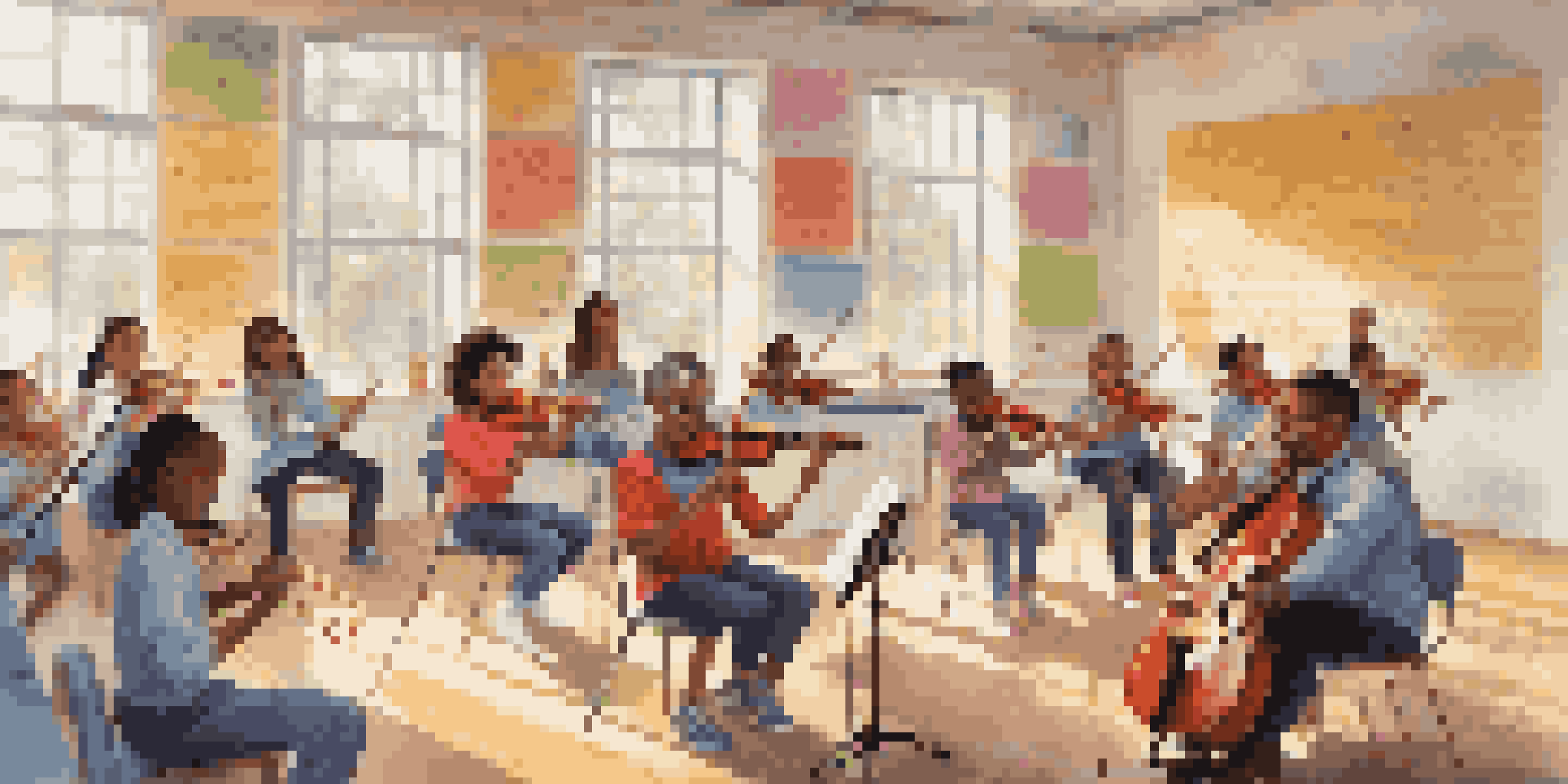Utilizing Music Education to Promote Positive Behavioral Changes

Understanding the Connection Between Music and Behavior
Music and behavior are intricately linked, with studies showing that musical engagement can lead to improved emotional and social skills. When students participate in music education, they learn to express themselves creatively, which often translates to better communication in everyday interactions. This connection can lead to a decrease in negative behaviors, as students find healthier outlets for their feelings.
Music can change the world because it can change people.
Moreover, music education fosters teamwork and responsibility through group activities like band or choir. Students must work together harmoniously, which builds essential social skills and encourages positive peer relationships. This sense of community can be a powerful tool in promoting behavioral change, as students learn the importance of collaboration.
Ultimately, understanding how music influences behavior is the first step toward leveraging it as a tool for positive change. By recognizing this connection, educators can create environments where students thrive both personally and socially, setting the stage for lifelong benefits.
Creating a Supportive Learning Environment
A supportive learning environment is crucial for harnessing the benefits of music education. When students feel safe and valued, they are more likely to engage deeply with the material and express themselves authentically. This emotional safety can lead to more positive interactions and reduced behavioral issues, as students are less likely to act out when they feel secure.

Incorporating music into the curriculum allows for varied teaching methods that cater to different learning styles. This inclusivity not only enhances academic performance but also encourages a sense of belonging among students. When children see that their unique talents are appreciated, they are more motivated to participate and contribute positively to the classroom culture.
Music Boosts Emotional Skills
Music education enhances emotional awareness, helping students express their feelings and develop empathy.
Creating this nurturing atmosphere requires commitment from educators and school staff. By actively promoting respect, empathy, and collaboration, schools can ensure that music education becomes a driving force for positive behavioral changes among students.
The Role of Discipline in Music Education
Discipline is a key element of music education that can lead to positive behavioral changes. Learning an instrument or participating in a choir requires consistent practice and dedication, teaching students the value of perseverance and hard work. These qualities can extend beyond the music classroom, influencing how students approach challenges in their academic and personal lives.
The beautiful thing about learning is that no one can take it away from you.
Moreover, the structured environment of music classes helps students understand the importance of rules and routines. They learn to respect their teachers, peers, and the creative process, which translates into better behavior in other settings. This sense of discipline fosters self-regulation, allowing students to manage their emotions and actions more effectively.
Ultimately, the discipline learned through music education empowers students to take control of their behavior. By instilling these values, educators can help shape responsible, respectful individuals who are better equipped to navigate life's challenges.
Enhancing Emotional Awareness Through Music
Music education provides a unique platform for enhancing emotional awareness among students. Through the exploration of different musical styles and genres, students learn to identify and express their feelings in a productive way. This emotional intelligence is essential for developing empathy and understanding the perspectives of others, leading to healthier relationships.
Participating in music activities, such as songwriting or improvisation, encourages students to channel their emotions creatively. This not only serves as an outlet for stress but also fosters a deeper connection to their own thoughts and feelings. As students become more in tune with their emotions, they are better equipped to handle conflicts and challenges in a positive manner.
Group Music Builds Social Skills
Collaborative music activities teach students effective communication and teamwork, fostering essential social skills.
By incorporating emotional awareness into music education, educators can cultivate a generation of empathetic individuals. This focus on emotional growth can significantly contribute to a more harmonious school environment, reducing behavioral issues and promoting positive interactions.
Building Social Skills Through Group Music Activities
Group music activities, such as ensembles or choirs, are a fantastic way to build social skills among students. These collaborative experiences teach students how to communicate effectively, listen actively, and work together towards a common goal. As they navigate the dynamics of group performance, they develop essential interpersonal skills that are crucial for positive behavior.
Moreover, being part of a musical group instills a sense of belonging and community. Students learn to appreciate each other's strengths and support one another, fostering friendships that can lead to a more positive school climate. This camaraderie can reduce feelings of isolation and promote inclusivity, further enhancing behavioral outcomes.
Ultimately, group music activities serve as a microcosm of society, where students learn vital social skills in a safe and enjoyable environment. These experiences not only enhance their music education but also prepare them for positive interactions in the wider world.
Engaging Parents and Community in Music Education
Engaging parents and the community in music education can significantly impact student behavior. When families understand the benefits of music education, they are more likely to support their children's involvement, reinforcing positive behaviors at home. This alignment between home and school can create a powerful support system for students.
Community engagement can take many forms, such as concerts, workshops, or volunteer opportunities. These events not only showcase students' talents but also foster a sense of pride and accomplishment. When students feel celebrated by their families and community, they are more motivated to behave positively and strive for excellence.
Parental Engagement Matters
Involving parents and the community in music education reinforces positive behaviors and creates a supportive environment for students.
By actively involving parents and the community, schools can create a holistic approach to music education that extends beyond the classroom. This collaborative effort can inspire students to embrace positive behaviors and contribute to a thriving school culture.
Measuring the Impact of Music Education on Behavior
Measuring the impact of music education on student behavior is essential for understanding its effectiveness. Schools can utilize various assessment methods, such as surveys and behavioral observations, to track changes in students' social skills and emotional well-being. This data can provide valuable insights into how music education influences behavior and helps identify areas for improvement.
Additionally, case studies and success stories can illustrate the transformative effects of music education on students' lives. By highlighting specific instances where music has led to positive behavioral changes, schools can inspire others to invest in similar programs. These narratives can also serve as motivation for students and educators alike, reinforcing the importance of music education.

Ultimately, measuring the impact of music education is about more than just numbers; it's about understanding the profound effect it can have on students' lives. By prioritizing assessment and evaluation, schools can continue to refine their music programs and maximize their positive influence on student behavior.